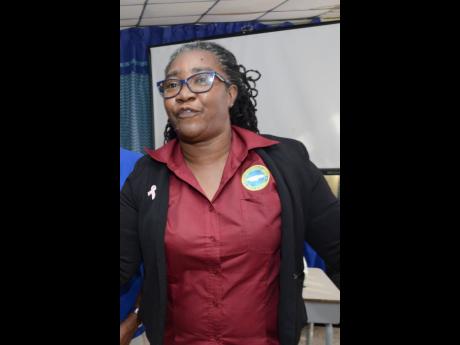Tufton, nurses row over US recruitment
President of the Nursing Association of Jamaica (NAJ), Patsy Edwards-Henry, has accused the Ministry of Health of not doing adequate consultation before the mass recruitment of overseas nurses as part of the $1.3-billion ‘Code Care’ initiative...
President of the Nurses Association of Jamaica (NAJ), Patsy Edwards-Henry, has accused the Ministry of Health of not doing adequate consultation before the mass recruitment of overseas nurses as part of the $1.3-billion 'Code Care' initiative targeting the clearing of more than 6,000 backlogged cases.
The case pile-up occurred during the heights of the coronavirus pandemic, which caused healthcare resources to be rechannelled to battle the highly contagious respiratory disease which has killed 3,310 people here and infected more than 151,000.
Over the next 10 months, the ministry will be embarking on partnerships with private healthcare facilities to provide surgery and recovery spaces for patients, undertake the repair of operating theatres to the tune of $700 million, and engage diaspora specialist nurses on short-term agreements to support surgeons.
While agreeing that the long-standing issue of backlogged surgeries needs to be addressed, Henry, who has just been returned for her third term as president, is not pleased with the Government's decision to bolster recruitment instead of consulting with the domestic workforce.
The NAJ president said that “a lot of logistics needs to be fine-tuned” before her organisation comes fully on board, insisting that there needs to be dialogue with Jamaican nurses.
“When you bring persons in who have not worked in our sector, these persons are going to need orientation and they will now have to adjust to the culture of the people and the organisation to which they go to work,” said Henry in a Gleaner interview.
“When you take somebody into your organisation for five days, how much orientation can they get to work? So it therefore means that, even while we are having these nurses come in, they will still have to be twinned with, and work with, our Jamaican nurses,” she added.
But Health and Wellness Minister Dr Christopher Tufton has defended the programme, saying the majority of the 100 nurses who have expressed interest are Jamaican expatriates.
Tufton said that the $200-million initiative will cover airfare, accommodation, and transportation costs for the nurses, who will also benefit from a two-day vacation at a local hotel.
Data from the Nursing Council of Jamaica show that, over the last four years, 2,629 requests for transcripts from international agencies were received and processed. These transcripts signalled migration intention. The bulk of those requests, 2,014, came from the US.
“This is not an attempt at recruiting to replace Jamaican nurses or others in the health system, it is an attempt at building capacity to provide human resources where those resources don't exist or are in short supply. So there is no need to be intimidated by the prospect of having these short-term exchanges,” Tufton asserted.
Henry said hospitals were already implementing measures to clear backlogs, including resorting to weekend surgery marathons. She said they were also looking to pool resources from other less-stressed hospitals.
“The money that you are spending now to bring in nurses, pay per diem, pay transportation, waive the cost for registration and licensing, and vacation that they will get at the end of it; how can that money be allocated in a manner to say let us pull a team together?” she asked.
She added: “We're not throwing it out the window. We're willing to have the fulsome discussion.”
Tufton has signed nurse-training MOUs with the University of Miami Health and Hartford Health in Connecticut.
Under the initiative, training would take place in Jamaica and continue in the US, where there is more advanced infrastructure, clinical rotation, and faculty.
“We need to accept that we have a shortage and it is global. We in countries like Jamaica are primary supply countries to the demand countries that are paying more and better, and that it is important that we collaborate to expand the field,” he said.
Tufton made the declaration at the Pan American Health Organization 74th Session of the Regional Committee of the World Health Organization in Washington on Tuesday.
The minister was a panellist on the Americas Health Corps initiative to train 500,000 public healthcare workers throughout the region over the next five years.
“We would like to train more, but we are limited by faculty and clinical rotation space, and that is why this collaboration to expand capacity through partnerships is so necessary, and I believe not just for Jamaica but for smaller countries in the Caribbean region,” Tufton said.

